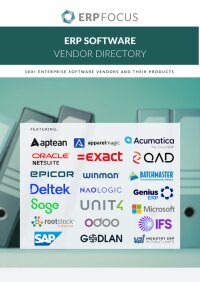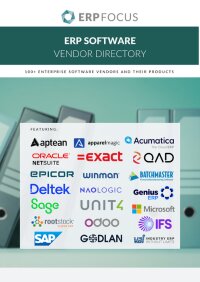ERP development jobs - four questions to expect at interview
For many ERP development job-seekers, interviewing for a new job is fraught with all kinds of scary things like cataloging and explaining your resources experience, developing and formatting a proper technical CV, and/or defining and targeting likely companies. However, while the aforementioned areas of focus are important, once you’ve gone through that and more, there’s one more prep step that can create a bit of an advantage over the competition: business research.
This effort may not seem like much on the face of it, particularly when you’re looking for a development gig, but today’s enterprises’ reveal all kinds of useful information on the basis of business history and culture that a candidate can use to their advantage. Things like the likelihood of turnover risk, driven by a high-flying company history that exhibits a lot of turbulent market behavior; or an inverse recognition, based on a staid corporate history that offers a lot of historical hamburger-grinding, while never quite managing to make a tasty meatloaf, can allow a candidate to choose an educated employment path driven by what the company represents, rather than being blinded-sided by the interview process, and end up in a commercial culture that hates you, as much as you hate it.
All that said, as a candidate, you’ll want to know more about the company than the company will know about you from the outset, so use whatever information that’s available to best effect. At the end of the day, this bit of awareness can separate company hyperbole from practical reality, thereby allowing you to end up with a win-win situation, or walk away, knowing that you dodged a bullet.
4 questions to ask yourself before the interview
Frankly, most HR types will tell you that there are no specific sets of questions when interviewing candidates, although most of the time, similar questions appear nearly every time around. For example; what’s your work background? What experience do you have? What do you want from your job? What challenges do you see? And so on.
While these kinds of questions appear to be driven by a central theme of getting to know each other, also bear in mind that these queries are largely screening questions, based on excluding, rather than including candidates. Unfortunately, the hard truth here is that companies typically see many more candidates than available FTE slots.
In this case, then, the first round goal is to establish a group of cream of the crop candidates that can be selected for the second, and sometimes third round interviews typically run by operational line or senior managers.
So, assuming that you’re one of the top candidates, what questions should you expect in this case? From an ERP development perspective, here are four question types you might want to be prepared for.
1. Given your experience, how do you respond when the company’s ERP platform fails?
From a management perspective, this is really a bit of a trick question since a) the manager is really looking to see how much homework you’ve done on the company and its systems; b) how intellectually nimble you are, or in simple terms, are you able to respond positively under pressure (now and then); and c) can you deliver a logical response to a challenge that offers little detail, but also requires a general, and legitimate, understanding of what might resolve the issue.
2. You find yourself understaffed, but a production deadline is looming. What do you do?
Again, this kind of question largely applies to item b) above. However, the question also gives the manager an opportunity to see how the candidate will respond to a lousy situation that is critical, yet can’t be helped. In my particular management experience, I have had candidates get irritated in the face of this kind of scenario-setting, which as a senior manager making a quality judgment about a potential employee, immediately caused me to terminate the interview and move on. On the other hand, however, other candidates didn’t get flustered and offered a more appropriate response. But here’s the deal, this is a serious game, but a game nevertheless. Consequently, be must be prepared for anything.
3. You’ve had a bad week working with a difficult colleague in Production Scheduling, and you’re about to leave for the weekend when the ERP system drops offline. Consequently, the failure threatens a critical, after-hours production run. How do you respond?
Again, this is a trick question, since the point is not really about the system's failure, so much how the candidate responds from a team response perspective. If the candidate won’t help a balky teammate when the chips are down, it’s also likely that the candidate won’t respond positively on a good day. Again, this is a game, play to win, or don’t bother wasting anyone’s time; and remember time is money.
4. You’re in your office when the Sales Director calls saying that all sales workstations in his work center have suddenly been locked out while exhibiting virus alerts. A moment later, the CIO calls you with the same alert; and a moment after that, other work centers begin to call with similar alerts. What do you do?
Note the central pattern here. All of these questions are driven to see how the candidate will respond during a crisis since if he/she can deal with an unusual issue, in an unusual setting, chances are that person will be able to provide serious value to the bottom-line once the real game is on the line.
I have utilized all of these interview questions when hiring candidates during my time as a C-level, and thankfully, had generally great relationships with my employees throughout all of my public and private company engagements. My staff turnover was always notably low, and in several cases, employees followed me wherever I went during a multiple-decade executive career. So, be that kind of interview candidate, and you’ll hopefully find an employer that respects your efforts on his behalf. Do your homework, and always bring your ‘A’ game, since you can never tell when a simple job can become a career.
Free white paper

ERP Software Vendor Directory
Put the most comprehensive ERP vendor directory on your desk today

Related articles
-

Budgeting for an ERP consultant
How much can you expect to pay out for an ERP consultant?
-

Secret KPI: Why Your ERP Implementation Team Matters More Than Software
Learn how Godlan ensures successful ERP implementation for manufacturers with proven strategies &...
-

The role of consultants in an ERP project
How can a consultant help you achieve ERP implementation success?

